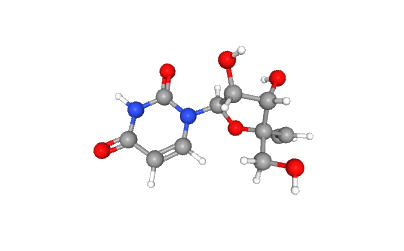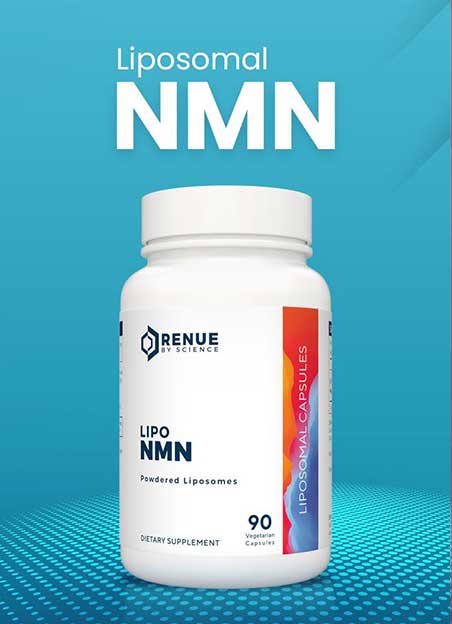Uridine is a chemical compound, primarily found in RNA. The IUPAC name for the compound is 1-[(2R,3R,4S,5R)-3,4-Dihydroxy-5-(hydroxymethyl)oxolan-2-yl]pyrimidine-2,4(1H,3H)-dione.
The chemical structure of Uridine is given in the figure below:

Molecular Structure of Uridine
Uridine is an important compound for a range of bodily processes. It helps in the proper functioning of various neurological, cardiovascular, and psychological processes. Recent research has stressed the importance of uridine in maintaining the physiological and psychological health of the body.
In order to understand what exactly Uridine is and what is its importance, we should look at the place where it is found: the RNA.
RNA (Ribonucleic Acid) is structured similar to DNA (Deoxy Ribonucleic Acid) but with a few changes. DNA encodes all the genes in your body and stores the genetic information needed. RNA translates the genetic information in the form of proteins.
The way RNA translates the genetic information from DNA into proteins is with the help of uridine. RNA uses the ribonucleotide present in uridine.
Uridine also plays a vital part in breaking down sugar in the body to produce energy. It also plays an important part in the central nervous system.
Uridine is created in the liver of adults. Uridine largely exists in the form of uridine monophosphate (UMP) in the body. After production in the liver, UMP is secreted in the bloodstream directly which delivers it to the organs that need it.
Uridine Food Sources

Picture by Kazuend at Unsplash
Following are the food sources through which uridine can be obtained:
- Breast milk for babies
- Nutritionist and brewer’s yeasts
- Organ meats
- Fish
- Oats
- Broccoli
- Mushrooms
- Beer
One study claimed that uridine is not bioavailable for humans through food sources. It can be extracted and used as a supplement. If you need to increase your intake of uridine, it would be beneficial if you could take supplements after consulting with your doctor.
Benefits of Uridine
As apparent from the above section, uridine is a vastly important substance that is needed for many vital processes in the human body. Following is a discussion of some of the key benefits of uridine.
Memory and Learning

Picture by Milad Fakurian at Unsplash
One of the key ways through which uridine benefits the human body is through its impact on learning and memory.
One of the most prominent memory enhancers in our brains is called CDP-choline. The brain makes use of uridine in order to make that enhancer. Uridine is also involved in the production of a number of other phospholipids.
According to a study by Nivedita Agarwal and her team, the brain imaging of 17 healthy participants showed that uridine supplements were responsible for a significant increase of a phospholipid building block known as phosphoethanolamine (PEtn). This shows that uridine is fundamental to the process of manufacturing brain phospholipids.
Another important brain function performed by uridine is its role in remembering and learning. It achieves that through enhanced synapse formation and neuronal plasticity. This helps the brain in adapting better, regrowing, remembering, and learning.
The same studies that showed the above also concluded that uridine enhances the production of neurite outgrowth, a process that helps in the regeneration and regrowth of brain cells.

Picture by Hal Gatewood at Unsplash
Furthermore, the studies also showed that synaptic protein production also increased with the help of uridine. Synaptic proteins are proteins that are used by different brain cells to communicate with each other. In the absence of these proteins, synapses get destroyed, something that leads to Alzheimer’s disease in the longer term.
Another study shows that uridine also impacts dendric spines. These spines are the backbone of the neurons that are considered to store memory.
The above-mentioned findings were further confirmed by two more studies. These studies were both performed on gerbil brains.
Richard Wurtman and his team validated the enhancement of an increase in synaptic proteins and phospholipids after the influence of uridine in a study that showed the connection between uridine and improved cognitive function.
Similarly, Sara Holiguin and her team also found out that when uridine works in conjunction with DHA and choline, it enhances the cognitive function of the brain.
Studies have also shown that uridine is also fundamental in promoting the birth of new neurons, along with the nerve growth factor (NGF). Uridine activates the P2Y2 receptor in the brain which helps in repairing the injured neurons and promoting the birth of new ones.
In short, it can be said that uridine is fundamental to a range of processes in the brain related to neuron growth, regeneration, memory, learning, and cognition.
Nerve Damage and Pain
Another important benefit of uridine is that it has the potential to greatly help patients with nerve pain and damage.
A study by Louis Negrao and his team conducted a study involving 48 people suffering from peripheral neuropathy. In the study, the participants were given a combination of uridine, folic acid, and vitamin B12 for a total of 2 months.
Having the combination of meds for 2 months significantly reduced the associated symptoms, characterization and intensity of pain, and the total pain score of the patients. The study proved that uridine is effective in reducing nerve pain, especially in patients with carpal tunnel syndrome.
Similarly, another study also showed the efficacy of uridine in reducing nerve pain. The study comprised 400 people where a combination of cytidine, uridine, and vitamin B12 worked more effectively in reducing nerve pain as opposed to when only vitamin B12 was used. The side effects from the intake of the combination of the three supplements were very mild.
Furthermore, uridine also significantly improved the nerve health of those suffering from diabetic neuropathy. A study involving 20 patients with the condition showed that uridine helped improve the long-term damage to the nerves caused by the high levels of sugar in the patients’ blood.
Thus, it can be seen from the above discussion that uridine is vastly effective in improving nerve health and relieving nerve pain caused by various conditions.
Bipolar Disorder and Depression

Picture by Gadiel Lazcano at Unsplash
Since Uridine is responsible for the smooth running of several processes in the brain, it stands to reason that it also affects some psychological issues as well.
A common issue faced by people with bipolar disorder is that their membrane phospholipids may be altered, which may work as the underlying cause of their condition. A study revealed that in the nerve cell membrane, uridine is fundamental for improving the overall phospholipid structure.
Furthermore, in bipolar brains, the mitochondrial function is also lacking which often leads to severe depressive symptoms. Uridine helps improve the depressive symptoms in bipolar patients by improving their mitochondrial function in the brain.
Douglas G. Kondo and his team studied the effects of uridine on depression in bipolar patients in adolescents. The study lasted six weeks and reported significant improvement in the depressive symptoms of the adolescents with bipolar disorder when treated with uridine.
Another animal study also concluded that uridine and omega-3 fatty acids displayed anti-depressant effects.
While the preliminary studies about the anti-depressant effects of uridine are impressive, more research needs to be done to establish its anti-depressant effects.
Lung Diseases

Picture by Robina Weermeijer at Unsplash
Apart from the benefits mentioned above, research has shown a great promise in improving a lung condition known as cystic fibrosis.
Cystic fibrosis refers to a genetic disorder in which breathing becomes difficult due to damage caused to the lungs and the presence of a persistent sticky mucus around the organs.
Different uridine compounds have proven to be highly effective in many research studies exploring this disease.
In a study by WD Bennet and their team, a combination of amiloride and uridine triphosphate (UTP was used on 16 patients struggling with cystic fibrosis. The results were promising as the combination removed the mucus layer and restored breathing to almost normal levels. The improvements were less promising when UTP and amiloride were used separately.
Other than that, another study showed that a combination of sodium channel blockers and UTP helped relieve the symptoms of cystic fibrosis in laboratory mice.
Uridine has also proven effective in clearing the airways of people suffering from a genetic disorder named primary ciliary dyskinesia (PCK) where normal clearance of airways is made difficult. It also cleared mucus in patients with mild chronic bronchitis.
These studies show that uridine is highly effective in treating cystic fibrosis and other condition where mucus and airways need to be cleared.
Other Benefits
Other benefits of uridine are given in the following list:
- Uridine monophosphate (UMP) has been identified as an effective sleep aid in adults. A lot of you could use that.
- Dry eyes cause problems for at least 20 percent of people. Uridine oral supplements helped decrease dry eyes. This was done in a preliminary study and more studies need to be done before this can be used as a viable supplement to reduce dry eyes.
- A study has shown, that uridine levels are low in HIV patients. The antiretroviral medications taken by HIV patients cause distress in the legs, buttocks, arms, and face, rendering them without fat. Uridine helps restore fat and function in these organs.
Although a lot of uridine benefits have been discussed, it must be noted that the research on the benefits of uridine is still going on. Researchers need bigger samples to be able to prove the efficacy of uridine conclusively.
Frequently Asked Questions
Following are the most frequently asked questions about uridine.
1. What is the correct dosage for uridine?
While there is no officially recommended dosage for uridine, in clinical trials, the dosage for healthy adults ranged from 1000 mg per day to 2000 mg per day. You could split the dosage into several doses over the day.
2. How long should I take uridine?
If you are unclear about the duration, it might be better to consult your doctor. However, it is recommended that you do not take uridine for longer periods of time. It could lead to some complications, according to some animal studies done for the same.
3. Should I pair uridine with some other supplements?
Some pairings of uridine were discussed in the article for specific conditions. For example, uridine was effective in relieving nerve pain when paired with folic acid and vitamin B12.







